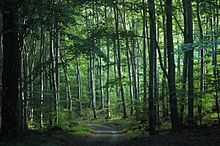Western European broadleaf forests

Typical beech forest
The palaearctic Western European broadleaf forests is an ecoregion, in the Temperate broadleaf and mixed forests Biome, that covers a large area in Western Europe including: Switzerland, Austria, France, Germany and Czech Republic.
Geography
The total Western European broadleaf forests area is around 490,000 km2 (189,190 sq mi). In particular the ecoregion is found in the Massif Central, Central German Uplands, Jura Mountains, Bavarian Plateau, and Bohemian Massif. It is essentially composed of lowland and alti-montane beech and mixed beech forests. It also includes small part of sub-Mediterranean regions.
Habitation
This area has been inhabited for thousands of years. It hosts large cities (Lyon, Nancy, Munich), some forests, but most of the countryside is agricultural land, cultivated with cereals (corn, wheat, oats). This ecoregion hosts a good variety of animal species, birds in particular, but most large mammals are in decline.
References
| |
| Apennine deciduous montane forests |
Italy |
| Atlantic mixed forests |
Denmark, France, Belgium, Germany, Netherlands |
| Azores temperate mixed forests |
Portugal |
| Balkan mixed forests |
Bulgaria, Greece, Macedonia, Romania, Serbia, Turkey |
| Baltic mixed forests |
Sweden, Denmark, Germany, Poland |
| Cantabrian mixed forests |
Spain, Portugal |
| Caspian Hyrcanian mixed forests |
Iran, Azerbaijan |
| Caucasus mixed forests |
Georgia, Armenia, Azerbaijan, Russia, Turkey |
| Celtic broadleaf forests |
United Kingdom, Ireland |
| Central Anatolian deciduous forests |
Turkey |
| Central China loess plateau mixed forests |
China |
| Central European mixed forests |
Austria, Germany, Lithuania, Moldova, Poland, Belarus, Czech Republic |
| Central Korean deciduous forests |
North Korea, South Korea |
| Changbai Mountains mixed forests |
China, North Korea |
| Changjiang Plain evergreen forests |
China |
| Crimean Submediterranean forest complex |
Russia, Ukraine |
| Daba Mountains evergreen forests |
China |
| Dinaric Mountains mixed forests |
Albania, Bosnia and Herzegovina, Italy, Montenegro, Serbia, Slovenia, Croatia |
| East European forest steppe |
Bulgaria, Moldova, Romania, Russia, Ukraine |
| Eastern Anatolian deciduous forests |
Turkey |
| English Lowlands beech forests |
United Kingdom |
| Euxine-Colchic deciduous forests |
Bulgaria, Georgia, Turkey |
| Hokkaido deciduous forests |
Japan |
| Huang He Plain mixed forests |
China |
| Madeira evergreen forests |
Portugal |
| Manchurian mixed forests |
China, North Korea, Russia, South Korea |
| Nihonkai evergreen forests |
Japan |
| Nihonkai montane deciduous forests |
Japan |
| North Atlantic moist mixed forests |
Ireland, United Kingdom |
| Northeast China Plain deciduous forests |
China |
| Pannonian mixed forests |
Austria, Bosnia and Herzegovina, Czech Republic, Hungary, Romania, Serbia, Slovakia, Slovenia, Ukraine, Croatia |
| Po Basin mixed forests |
Italy |
| Pyrenees conifer and mixed forests |
France, Spain, Andorra |
| Qin Ling Mountains deciduous forests |
China |
| Rodope montane mixed forests |
Bulgaria, Greece, Macedonia, Serbia |
| Sarmatic mixed forests |
Russia, Sweden, Norway, Denmark, Finland, Lithuania, Latvia, Estonia, Belarus |
| Sichuan Basin evergreen broadleaf forests |
China |
| South Sakhalin-Kurile mixed forests |
Russia |
| Southern Korea evergreen forests |
South Korea |
| Taiheiyo evergreen forests |
Japan |
| Taiheiyo montane deciduous forests |
Japan |
| Tarim Basin deciduous forests and steppe |
China |
| Ussuri broadleaf and mixed forests |
Russia |
| West Siberian broadleaf and mixed forests |
Russia |
| Western European broadleaf forests |
Switzerland, Austria, France, Germany, Czech Republic |
| Zagros Mountains forest steppe |
Iran, Arabian Peninsula |
